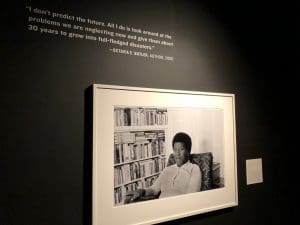Afrofuturism is having a moment! The Oakland Museum of California is currently hosting a stimulating multi-media exhibit on Afrofuturism that has been drawing crowds since it opened in early August. The exhibit will run through February 27, 2022.
What's compelling about the exhibit is how broad a net Afrofuturism casts. It is a movement that has political, artistic, environmental, psychological implications. This past spring, the Oakland Public Library hosted a virtual program called "Black Matters: the World of Afrofuturism" with filmmaker, curator and visual artist Celia Peters during which she spoke about the origins, development, and current popularity of Afrofuturism.
Using images from art, fashion, literature, and clips from music and films, she illustrated that Afrofuturism is a multidisciplinary, wide-ranging creative movement that centers Black history and culture. Ms. Peters cited the cosmologies of Nigeria, Mali, and Egypt as major influences, “cultures that show up in the DNA of Afrofuturism.”
Afrofuturism places Black protagonists and experiences at the center of a song, painting, story, or film. With the phenomenal international success of the film Black Panther, it is easy for some to think that Afrofuturism is a new concept. But today’s creative artists working in the genre have forebears. In literature Samuel R. Delaney, writing primarily in the 1960s and 1970s, is widely considered a pioneer of the genre. Author Octavia Butler, who Ms. Peters calls “the empress of Afrofuturist literature,” is one of its most widely read authors.

Free Jazz practitioners like Sun Ra, Jamaaladeen Tacuma, Ornette Coleman, and Miles Davis helped define the movement musically. Musical acts like Parliament Funkadelic, Betty Davis, and Labelle not only served up funk and electronica classics, they also created a futuristic sartorial style that became very popular. While much of Afrofuturistic literature is set in the tech-dependent present and future, its narratives are rooted in events and social and political issues of the past such as the impact of slavery, displacement, liberation struggles, and loss of identity.
Reimagining our world or creating new worlds are major preoccupations of Afrofuturists. Placing oneself in the future is a revolutionary act which speaks to our present national moment of racial reckoning. As we grapple with racial intolerance, anti-Black violence, rampant police brutality, voter suppression, epidemic displacement, and homelessness, there is a real hunger for stories that empower, uplift, represent, and honor Blackness in all of its variety.
Afrofuturism has become mainstream. Today we find three-time Hugo Award winning author N.K. Jemisin teaching an online MasterClass in “Fantasy and Science Writing.” Journalist and cultural critic Ta-Nehisi Coates’ has ventured into the field with his popular Black Panther graphic novel series and his debut novel The Water Dancer. Nigerian author Nnedi Okorafor’s novel Who Fears Death has been turned into an HBO film. Television shows like “Black Mirror,” “Luke Cage,” “Watchmen,” and the wildly popular “Lovecraft Country” are testaments to the movement gaining widespread appeal. In Iowa City, Iowa, there is a Center for Afrofuturist Studies. The annual AfroPunk Fest is another outlet for Afrofuturistic expression.
We can credit Dr. Martin Luther King, Jr., in part, for the enduring interest in Afrofuturism. It was he who convinced actress Nichelle Nichols--Lt. Uhuru on Star Trek--not to quit the series. According to the actress, Dr. King, a fan of the show, told her that Black kids and women need to see someone like her in space and in the future. Fortunately for all of us, she listened.
If you'd like to learn more about this creative movement, Ms. Peters has curated an Afrofuturist film festival, Blackness Revisualized, produced by PBS affiliate WNET in New York. The festival features ten films from five countries and will run through January 2022. She is also working on a film of her own entitled Godspeed. Look for it in the future!


Add a comment to: Black Matters: the world of Afrofuturism